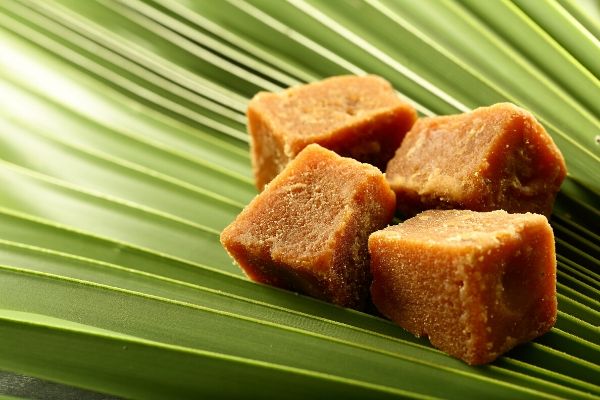Sugar and Jaggery are the two most commonly used sweeteners in our Country. Many Nutritionists recommend substituting sugar with jaggery as it contains much more benefits.
How sugar is different from jaggery
Sugarcane juice is the precursor for both sugar and jaggery. It is the processing method which makes them two entirely different product despite originating from one single product. Both of them are very much different from each other in terms of texture, color, or composition. Sugar is typically white in color, on the other hand, jaggery is yellow to brown in color. Sugar is hard crystal-like, whereas jaggery is semi-solid and unfixed shape. Sugar is first treated with charcoal, so that all the impurities get removed out and the product which comes out is clear syrup, this syrup is again condensed and crystalized to form sugar. Jaggery does not undergo any other chemical processing nor crystallization. It is boiled continuously to get thick required consistency and can then be molded to the desired shape. Sugar is pure sucrose whereas jaggery contains sucrose, minerals, irons, salt, and traces of fiber.
Jaggery is preferred over Sugar
Source of minerals – Jaggery being rich in minerals like Magnesium, Potassium, Calcium, Zinc hence is highly recommended for anaemic person. It does not go under any chemical process.
Fewer calories – Jaggery contains fewer calories as compared to sugar but has a high glycemic index.
Helps in digestion – Jaggery promotes digestion by removing toxins from the body. Having a small piece of jaggery after food is considered to be effective in the digestion process.
Jaggery is natural, without chemicals – As jaggery is not treated with any of the chemicals, it is purely natural and good for our body.
Helps in maintaining weight – Jaggery helps in keeping the electrolyte balance and prevents water retention in our body, thus helping in keeping the weight stable.
Jaggery is good for the lungs – According to Ayurveda, its antiallergic properties eliminate the toxins and mucus out of the respiratory systems. Helping in treating asthma, cough, and cold congestion by clearing the passage.
As a medicine – It contains antioxidant which is good for immunity. Antioxidants also prevent aging of cells.
Absorption is slow – As it is slowly absorbed compare to sugar, it does not raise the blood sugar level in our body.
Glycogenesis process
Glucose is the main source of energy that comes from the breakdown of sugar. The body enzymes modify the glucose molecules and convert them into energy, this energy is then used throughout the day. The energy generated after the breakdown of glucose can be stored for later purposes. This is called Glycogenesis. Glucose molecules are joined together to form a glycogen chain. This glycogen chain is broken down into a single glucose unit when there is no means of energy available.
Drawbacks of Jaggery
Increase risk of obesity – Even though jaggery is more nutritious than sugar but still it is a sweetener. Consuming a significant amount of added sugar can link to obesity to some extent. It has to be in moderation.
Intestinal discomfort – As jaggery is a less processed form of sweetener, it is safe to eat. Homemade jaggery can carry bacteria and lead to intestinal issues. Thus, it is recommended to use jaggery made by a commercial manufacturer and not a homemade one.
Other alternatives – Jaggery is a good replacement for sugar when it comes to simply replace the refinement process. However, if you are thinking to minimize the intake of any form of sweetener then stevia can be a better option.
If anyone wants to choose between refined sugar and jaggery then the latter is healthier as it provides the body with some minerals. But as it is said, too much of anything is not good for health. So, everything that you eat should be in moderation.

 Sugar and jaggery are used as the sweetener. Most of the Nutritionist recommends jaggery over sugar in our day to day life. Anything you eat should be in moderation.
Sugar and jaggery are used as the sweetener. Most of the Nutritionist recommends jaggery over sugar in our day to day life. Anything you eat should be in moderation.









.jpeg)



.jpeg)






.jpeg)









.jpg)


.jpg)
